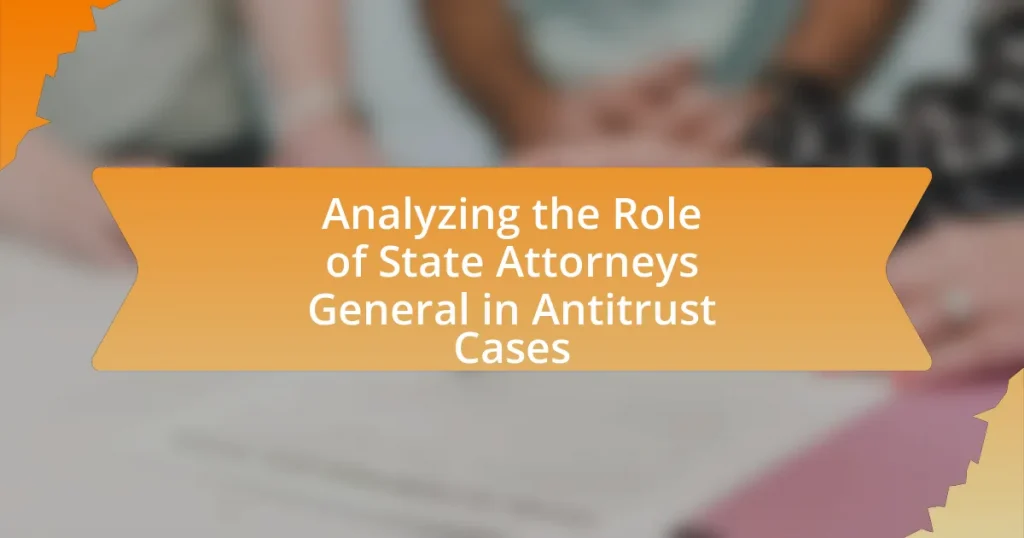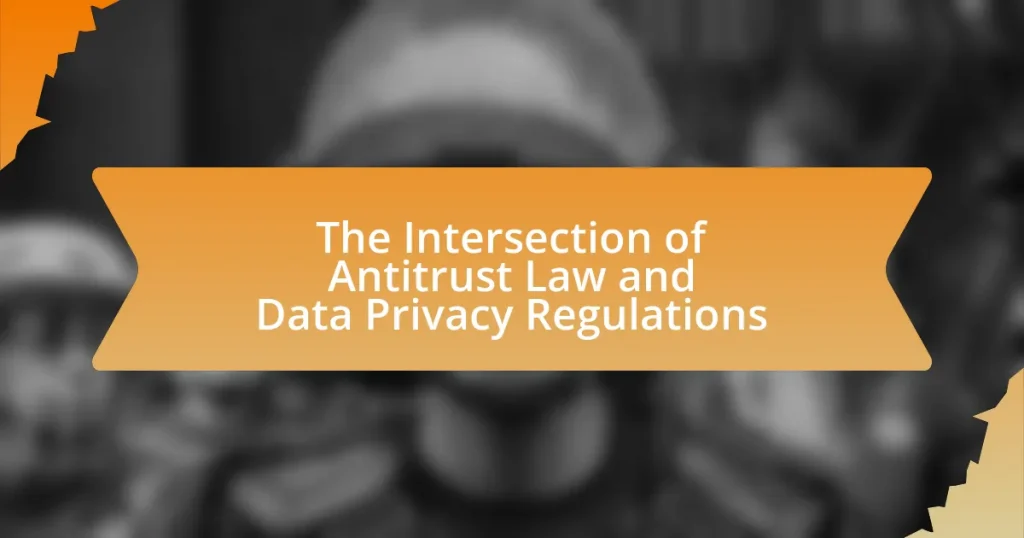State Attorneys General play a vital role in enforcing antitrust laws at both state and federal levels, aimed at protecting consumers and fostering competition. They possess the authority to investigate anti-competitive practices, initiate lawsuits, and collaborate with federal agencies, as demonstrated by significant cases such as the 2020 lawsuit against Google. This article explores the influence, powers, and challenges faced by State Attorneys General in antitrust enforcement, highlighting their unique perspectives and the impact of political factors on their actions. Additionally, it examines recent trends in antitrust litigation, effective strategies for enforcement, and best practices for collaboration with other entities.
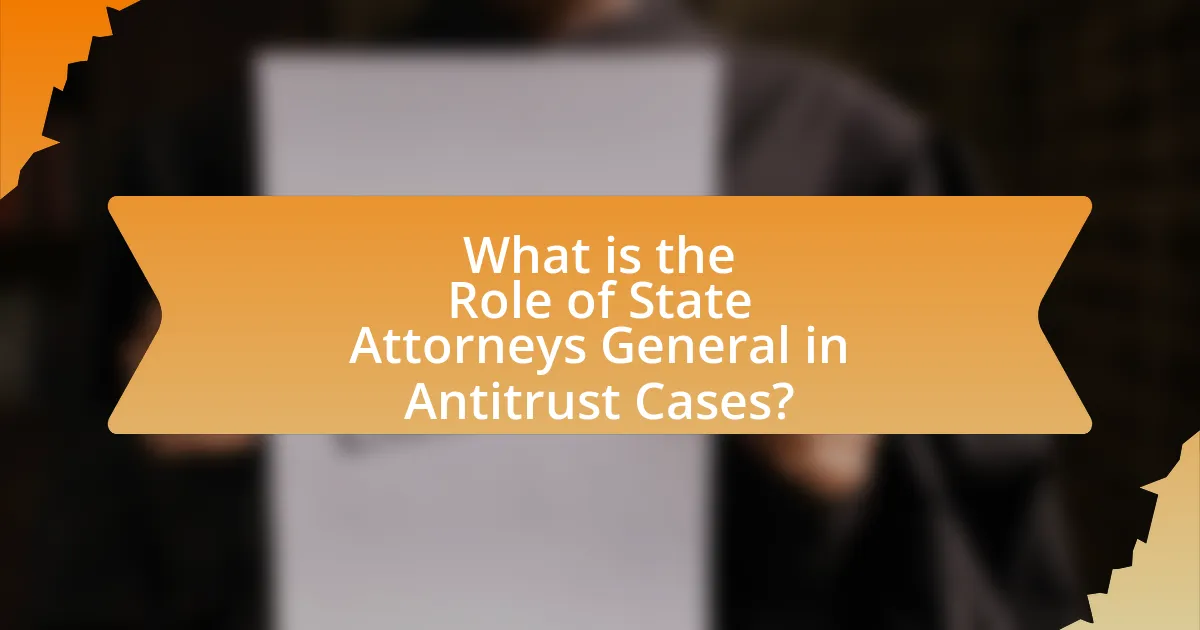
What is the Role of State Attorneys General in Antitrust Cases?
State Attorneys General play a crucial role in antitrust cases by enforcing state and federal antitrust laws to protect consumers and promote competition. They have the authority to investigate anti-competitive practices, file lawsuits against companies engaging in monopolistic behavior, and collaborate with federal agencies like the Department of Justice. For instance, in 2020, a coalition of State Attorneys General filed a landmark lawsuit against Google, alleging anti-competitive practices in the digital advertising market, demonstrating their active involvement in addressing monopolistic behavior.
How do State Attorneys General influence antitrust enforcement?
State Attorneys General influence antitrust enforcement by initiating lawsuits, conducting investigations, and collaborating with federal agencies to address anti-competitive practices. They have the authority to enforce state and federal antitrust laws, which allows them to challenge mergers, price-fixing, and monopolistic behavior. For instance, in 2020, a coalition of State Attorneys General led by New York and California filed a lawsuit against Google, alleging anti-competitive practices in the digital advertising market. This demonstrates their significant role in shaping antitrust policy and holding corporations accountable.
What powers do State Attorneys General have in antitrust matters?
State Attorneys General have the power to enforce state and federal antitrust laws, allowing them to investigate and prosecute anti-competitive practices. They can initiate lawsuits against companies for violations such as price-fixing, monopolistic behavior, and deceptive trade practices. Additionally, State Attorneys General can collaborate with federal agencies, like the Department of Justice, to address larger antitrust issues that cross state lines. Their authority is rooted in both state statutes and the Clayton Act, which empowers them to seek remedies including injunctions and monetary damages for affected consumers and businesses.
How do State Attorneys General collaborate with federal agencies?
State Attorneys General collaborate with federal agencies primarily through joint investigations and litigation efforts. This collaboration often occurs in antitrust cases, where state attorneys general may work alongside federal entities like the Department of Justice to address anti-competitive practices. For instance, in significant cases such as the 2020 lawsuit against Google, multiple state attorneys general joined forces with federal authorities to challenge the company’s market dominance, demonstrating a coordinated approach to enforcement. This partnership allows for resource sharing, expertise exchange, and a unified strategy to tackle complex legal issues effectively.
Why are State Attorneys General important in antitrust litigation?
State Attorneys General are important in antitrust litigation because they serve as key enforcers of state and federal antitrust laws, protecting consumers and promoting competition. Their authority allows them to initiate lawsuits against companies that engage in anti-competitive practices, such as price-fixing or monopolistic behavior. For instance, in 2020, a coalition of State Attorneys General successfully sued Google for antitrust violations, highlighting their role in holding large corporations accountable. This involvement not only enhances enforcement efforts but also provides a check on corporate power, ensuring that market dynamics remain fair and competitive.
What unique perspectives do State Attorneys General bring to antitrust cases?
State Attorneys General bring a unique perspective to antitrust cases by representing the interests of consumers and businesses within their states, often focusing on local market conditions and specific consumer harm. Their involvement allows for a more nuanced understanding of how antitrust violations impact state economies, as they can address issues that may be overlooked by federal authorities. For instance, State Attorneys General can leverage state laws that may be more stringent than federal antitrust laws, enabling them to pursue cases that protect local interests more effectively. This localized approach is evidenced by cases such as the multistate lawsuit against Google in 2020, where 38 states collaborated to address concerns specific to their jurisdictions, highlighting the importance of state-level insights in antitrust enforcement.
How do State Attorneys General address consumer protection in antitrust issues?
State Attorneys General address consumer protection in antitrust issues by enforcing state antitrust laws and participating in investigations and litigation against anti-competitive practices. They have the authority to initiate lawsuits against companies that engage in monopolistic behavior, price-fixing, or deceptive trade practices that harm consumers. For example, in 2020, a coalition of State Attorneys General filed a lawsuit against Google, alleging anti-competitive practices that stifled competition in the online advertising market, demonstrating their proactive role in safeguarding consumer interests.
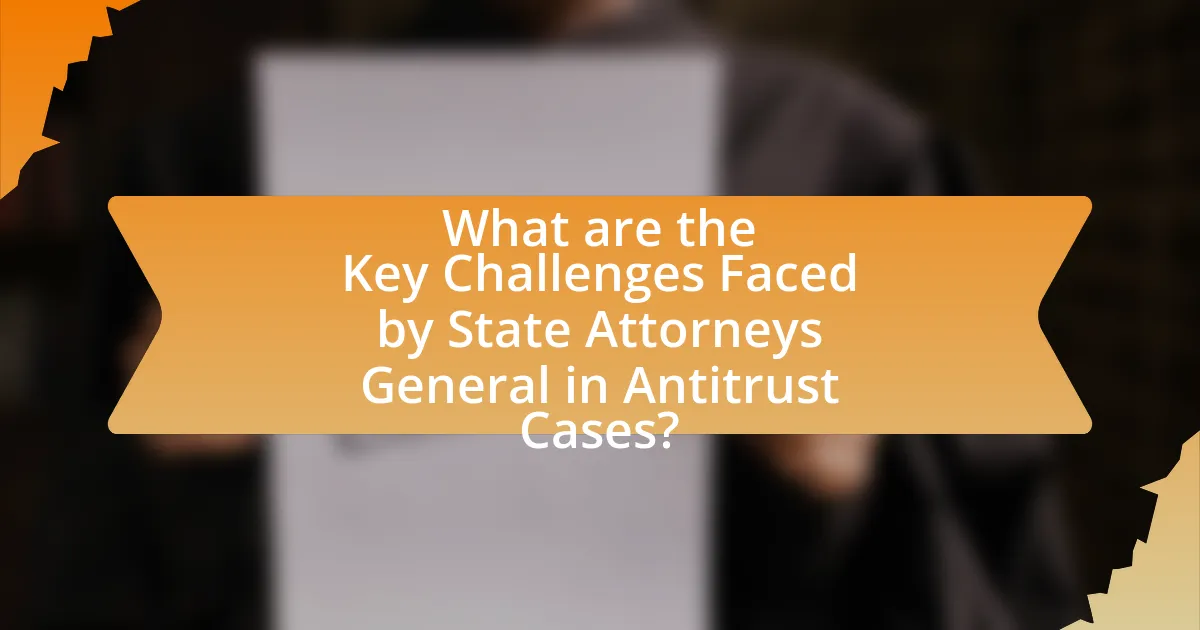
What are the Key Challenges Faced by State Attorneys General in Antitrust Cases?
State Attorneys General face several key challenges in antitrust cases, including limited resources, jurisdictional constraints, and the complexity of proving anti-competitive behavior. Limited resources hinder their ability to conduct thorough investigations and litigation, as many state offices operate with smaller budgets compared to federal agencies. Jurisdictional constraints can complicate enforcement, especially when dealing with multi-state or national corporations that may not be subject to state laws. Additionally, the complexity of antitrust laws requires a deep understanding of economic principles and market dynamics, making it difficult to build strong cases without extensive expertise. These challenges can impede the effectiveness of state attorneys general in addressing anti-competitive practices.
What legal obstacles do State Attorneys General encounter?
State Attorneys General encounter several legal obstacles, including limitations on their authority, jurisdictional challenges, and the need to navigate complex federal laws. These obstacles can restrict their ability to initiate antitrust actions effectively. For instance, the U.S. Supreme Court’s decision in the case of “Virginia v. West Virginia” established that state attorneys general must operate within the confines of state law, which can limit their enforcement capabilities against large corporations that operate across state lines. Additionally, federal preemption can hinder state-level antitrust enforcement, as seen in cases where federal law supersedes state regulations, creating a challenging landscape for state attorneys general to pursue antitrust claims.
How do jurisdictional issues affect antitrust enforcement by State Attorneys General?
Jurisdictional issues significantly impact antitrust enforcement by State Attorneys General by determining the scope and authority under which they can act. Each state has its own antitrust laws and enforcement mechanisms, which can lead to variations in how cases are pursued and the types of conduct that are actionable. For instance, some states may have broader definitions of antitrust violations compared to federal standards, allowing State Attorneys General to take action in situations where federal authorities may not. Additionally, jurisdictional conflicts can arise when multiple states seek to enforce their laws against the same entity, complicating coordination and potentially leading to inconsistent outcomes. This complexity is evident in cases like the multistate lawsuits against major tech companies, where differing state laws and priorities can shape the enforcement landscape.
What limitations do State Attorneys General face in resources and funding?
State Attorneys General face significant limitations in resources and funding, which restrict their ability to effectively pursue antitrust cases. Many state offices operate with constrained budgets, often relying on state appropriations that may not keep pace with the increasing complexity and volume of antitrust litigation. For instance, a 2020 report from the National Association of Attorneys General highlighted that nearly half of the states reported insufficient funding to adequately address consumer protection and antitrust enforcement. This financial shortfall can lead to understaffed offices, limiting the capacity to investigate and litigate cases against large corporations, which often have substantial legal resources at their disposal.
How do political factors influence the actions of State Attorneys General?
Political factors significantly influence the actions of State Attorneys General by shaping their priorities, strategies, and enforcement decisions. State Attorneys General often align their actions with the political climate, reflecting the interests of their constituents and party affiliations. For instance, during periods of heightened public concern over corporate practices, such as the tech industry’s market dominance, State Attorneys General may initiate antitrust investigations to address these issues, as seen in the 2020 lawsuits against major tech companies like Google and Facebook. Additionally, political pressure from advocacy groups and the electorate can drive State Attorneys General to pursue cases that resonate with public sentiment, thereby reinforcing their political standing.
What role does public opinion play in antitrust decisions made by State Attorneys General?
Public opinion significantly influences antitrust decisions made by State Attorneys General. This influence manifests through the pressure to address constituents’ concerns about monopolistic practices and market fairness. For instance, when public sentiment strongly opposes a merger or acquisition, State Attorneys General may be more inclined to investigate or challenge the deal, as seen in high-profile cases like the opposition to the merger between AT&T and Time Warner, where public backlash played a role in shaping the narrative. Additionally, public opinion can guide the priorities of State Attorneys General, prompting them to focus on issues that resonate with voters, thereby reinforcing their political capital and accountability.
How do partisan politics impact antitrust enforcement strategies?
Partisan politics significantly influence antitrust enforcement strategies by shaping the priorities and approaches of state attorneys general. For instance, Democratic attorneys general often focus on aggressive enforcement against large corporations, particularly in technology and healthcare sectors, while Republican counterparts may prioritize deregulation and support for business interests. This divergence is evident in cases like the 2020 antitrust lawsuits against Google and Facebook, where Democratic-led states emphasized consumer protection and competition, contrasting with Republican-led states that were more cautious about regulatory overreach. Such political alignment affects the resources allocated to investigations, the types of cases pursued, and the overall enforcement climate, ultimately impacting market competition and consumer welfare.
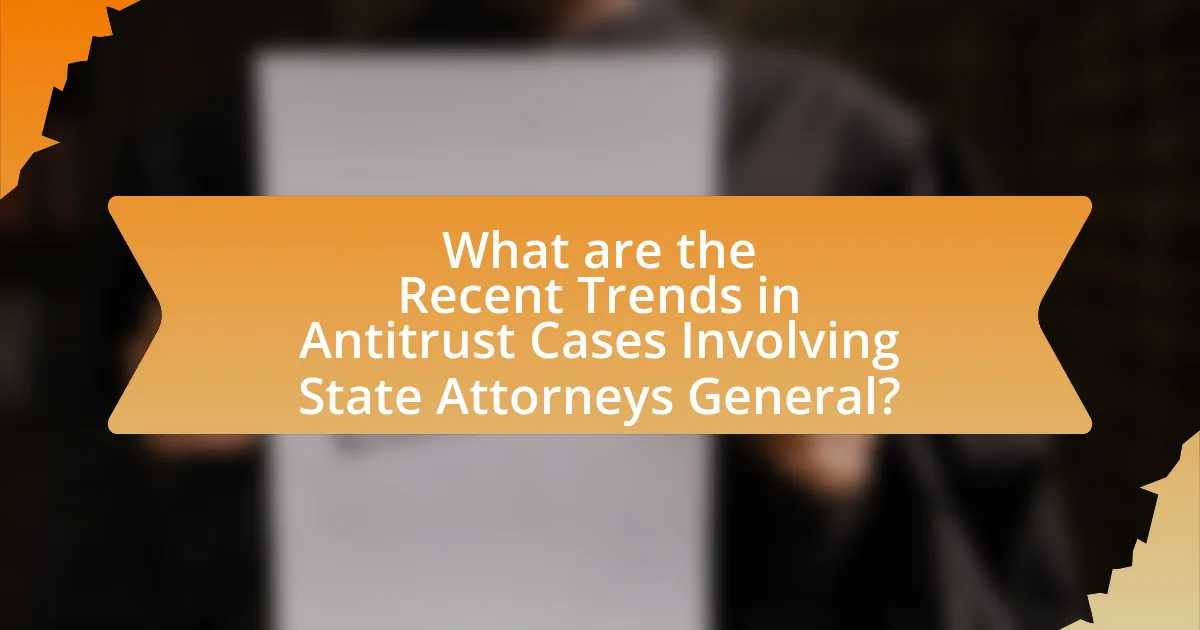
What are the Recent Trends in Antitrust Cases Involving State Attorneys General?
Recent trends in antitrust cases involving state attorneys general indicate an increase in collaborative efforts among states to challenge large corporations, particularly in technology and healthcare sectors. For instance, in 2020, a coalition of 48 state attorneys general filed a lawsuit against Google, alleging anti-competitive practices in its advertising business. This reflects a broader strategy where state attorneys general are leveraging their collective power to address perceived monopolistic behaviors, often in conjunction with federal investigations. Additionally, there is a growing focus on consumer protection and market fairness, as seen in cases targeting pharmaceutical companies for price-fixing. These trends underscore a proactive approach by state attorneys general to enforce antitrust laws and protect consumer interests.
How have recent antitrust cases shaped the role of State Attorneys General?
Recent antitrust cases have significantly expanded the role of State Attorneys General by empowering them to take more proactive legal actions against large corporations. This shift is evidenced by high-profile cases, such as the multistate lawsuit against Google in 2020, where 38 states and territories joined forces to challenge the company’s dominance in online advertising. Such collaboration among states has not only increased their influence in antitrust enforcement but also highlighted their ability to address consumer protection issues at a state level. Furthermore, the growing trend of bipartisan support for antitrust actions among State Attorneys General indicates a unified approach to tackling monopolistic practices, thereby reinforcing their critical role in maintaining market competition.
What notable cases have State Attorneys General pursued in recent years?
State Attorneys General have pursued several notable antitrust cases in recent years, including the landmark lawsuit against Google in 2020, where a coalition of 11 states accused the tech giant of anti-competitive practices in its search and advertising businesses. Additionally, in 2021, a group of states filed a lawsuit against Facebook, alleging that the company engaged in anti-competitive behavior by acquiring potential rivals like Instagram and WhatsApp to maintain its monopoly. These cases reflect a growing trend of state-level enforcement in antitrust matters, emphasizing the role of State Attorneys General in regulating large corporations and protecting consumer interests.
How have outcomes of these cases influenced future antitrust actions?
Outcomes of antitrust cases have significantly shaped future antitrust actions by establishing legal precedents and influencing regulatory approaches. For instance, landmark cases like United States v. Microsoft Corporation set a framework for evaluating monopolistic practices, leading to more aggressive scrutiny of tech giants in subsequent investigations. Additionally, the outcomes of these cases have prompted state attorneys general to collaborate more effectively, as seen in multi-state lawsuits against companies like Google and Facebook, thereby enhancing enforcement mechanisms and expanding the scope of antitrust actions. These developments reflect a growing recognition of the need for robust antitrust enforcement to promote competition and protect consumer interests.
What strategies are effective for State Attorneys General in antitrust litigation?
Effective strategies for State Attorneys General in antitrust litigation include coalition building, utilizing state laws, and leveraging public opinion. Coalition building allows multiple states to join forces, increasing resources and influence, as seen in the 2020 lawsuit against Google, where 11 states collaborated. Utilizing state laws can provide broader grounds for action than federal laws, enabling Attorneys General to address local market concerns effectively. Additionally, leveraging public opinion through media campaigns can raise awareness and support for antitrust actions, exemplified by the public backlash against large corporations during high-profile cases. These strategies enhance the effectiveness of State Attorneys General in pursuing antitrust litigation.
How can State Attorneys General leverage partnerships for successful outcomes?
State Attorneys General can leverage partnerships with federal agencies, other state attorneys general, and private organizations to achieve successful outcomes in antitrust cases. By collaborating with the Federal Trade Commission and the Department of Justice, state attorneys general can share resources, expertise, and data, enhancing their ability to investigate and prosecute antitrust violations effectively. For instance, joint investigations can lead to more comprehensive evidence collection and stronger legal arguments. Additionally, partnerships with other state attorneys general can amplify their collective voice, as seen in multi-state lawsuits against large corporations, which can result in significant settlements or changes in corporate behavior. Furthermore, engaging with consumer advocacy groups can provide valuable insights into market practices and consumer harm, strengthening their cases. These collaborative efforts have historically led to successful outcomes, such as the landmark antitrust case against Microsoft in the late 1990s, where state and federal collaboration played a crucial role in the resolution.
What best practices should State Attorneys General adopt in antitrust cases?
State Attorneys General should adopt a collaborative approach with federal agencies in antitrust cases to enhance enforcement effectiveness. This practice allows for resource sharing, expertise exchange, and a unified strategy against anti-competitive behavior. For instance, the 2019 multi-state lawsuit against Google demonstrated the benefits of collaboration, as multiple states combined their resources and legal expertise to challenge the tech giant’s market practices. Additionally, State Attorneys General should prioritize transparency and public engagement, ensuring that stakeholders understand the implications of antitrust actions. This approach fosters trust and encourages community support, which is crucial for successful litigation. Furthermore, leveraging data analytics to identify anti-competitive practices can enhance case selection and strategy, as evidenced by the increasing use of economic analysis in recent antitrust investigations.
